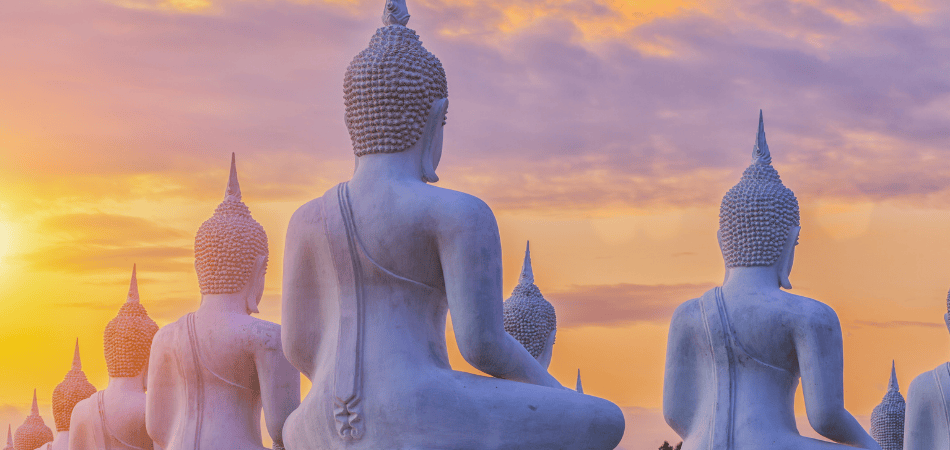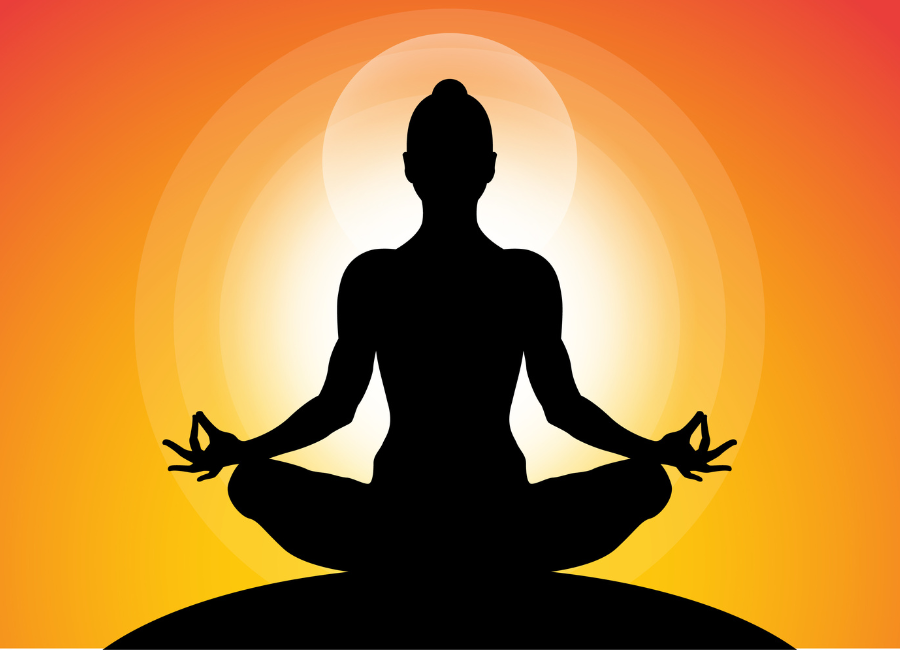Last Updated:
December 4th, 2023

Our understanding of mental health has been built slowly over many centuries, with various ancient cultures offering unique insights. Some of the most important insights come from cultures in the East, particularly those where the practice of meditation is important. While Eastern meditation practices may be deeply rooted in age-old traditions, drawing from these ancient reservoirs of knowledge can provide a holistic approach to a number of mental health and addiction concerns.
In a society that is finally beginning to prioritise mental well-being and recognise the interconnectedness of mind, body, and spirit, let’s explore the power of ancient mindfulness and how Eastern meditation can enhance and complement modern therapeutic practices.
Historical context of meditation in eastern cultures
Meditation, as a practice, has been sewn into the tapestry of human history for millennia. Its early imprints can be traced back to the ancient civilisations that flourished alongside the Indus Valley over 5,000 years ago. Archaeological discoveries from this period, such as terracotta seals depicting figures in meditative poses, suggest that humans have sought inner stillness and a deeper understanding of their minds long before contemporary discussions on mental health began.

Many Eastern philosophical traditions recognised the tumultuous nature of the human mind and acknowledged the suffering it could manifest. Meditation, in this historical backdrop, was not just a tool for spiritual ascension but a method for mental cultivation and well-being. By focusing on the mind and observing its patterns, ancient practitioners believed they could break free from the cycles of distress and dissatisfaction.
Buddhism and The Four Noble Truths
Buddhism, one of the world’s major religions, was born from the teachings of Siddhartha Gautama, commonly known as the Buddha. At its core, Buddhism is not just a religion but a profound philosophy that delves deep into the nature of suffering and the ways to alleviate it. This understanding is encapsulated in the Four Noble Truths:
- Dukkha (suffering):
Dukkha acknowledges the inherent suffering in life. From the pain of birth to the inevitability of death, from minor annoyances to deep-seated anguish, suffering is a part of the human experience.
- Samudaya (origin of suffering):
Samudaya digs into the roots of this suffering, attributing it primarily to our desires and attachments. This isn’t limited to material desires but also includes our emotional and mental attachments.
- Nirodha (the end of suffering):
Niordha offers hope and conveys that there is an achievable end to suffering. This state of complete liberation is Nibbana (or Nirvana).
- Magga (path to the end of suffering):
Magga lays out the Eightfold Path, a comprehensive guide to ethical and mental development leading to Nibbana. This path emphasises moral virtues, concentration and wisdom.
Meditation in Buddhism
Central to these four truths is the role of meditation. Meditation in Buddhism is not an escape but a deep dive into reality. It is about confronting your suffering, understanding its origins, and methodically working towards its cessation.
This introspective journey offers invaluable insights for contemporary mental health clients and practitioners. For instance, the practices of mindfulness and loving-kindness meditation, both rooted in Buddhist tradition, are common in modern therapeutic contexts and are effective in alleviating symptoms of stress, anxiety and depression.
Hinduism and the universal spirit
Hinduism, the ancient spiritual tradition of the Indian subcontinent, has gifted the world with a myriad of philosophical and meditative insights. Central to Hindu thought is the idea of the ‘Atman’ or the soul, and the ‘Brahman’, the universal spirit. The journey of life is often seen as a quest for the realisation of the soul’s oneness with the universal spirit. Meditation, or ‘Dhyana’, is pivotal in this journey.
Meditation in Hinduism
Derived from the Sanskrit word, which means contemplation and meditation, ‘Dhyana’ concentrates the mind and intellect while identifying with the soul. The ultimate goal is ‘Samadhi’, or union with the divine, which results in heightened self-awareness, inner peace and clarity of thought.
Many of these techniques have been adapted for therapeutic purposes in modern society. For instance, mantra meditation, where you focus on a word or series of words, reflects contemporary mindfulness exercises used in mental health and addiction treatment. The repetition, much like the rhythm of a soothing song, has a calming effect on the brain, diverting it from distressing thoughts and anchoring it in the present.
Zen: The essence of simplicity
Zen is not merely a form of meditation; it is a philosophy, a way of life that calls for complete immersion in the current moment. Amidst the cacophony of modern life where notifications, obligations and distractions incessantly tug at our attention, Zen can bring deep serenity to your life.
At its simplest, Zen is all about living in the here and now. Whether it’s the act of drinking tea, listening to someone speak or even just walking, Zen teaches us to do it with complete awareness, devoid of judgements and preconceptions.
Zen and modern psychotherapy
This unwavering focus on the present has profound implications for mental health. Many emotional challenges arise from obsessing about the past or excessive worry about the future. By anchoring our minds to the here and now, Zen helps alleviate stress and brings clarity to our minds.
The principles of Zen have deeply influenced many modern therapeutic techniques. For instance, Dialectical Behaviour Therapy (DBT), used to treat conditions like borderline personality disorder and chronic suicidal ideation, incorporates mindfulness exercises reflective of Zen practices.
Yoga: The union of body and mind
From ancient ashrams in India to contemporary studios in urban cities, Yoga has endured and evolved over millennia. While many in the West associate Yoga predominantly with its physical postures (asanas), the ancient yogic scriptures delineate an eight-fold path, ranging from ethical guidelines to deep states of meditation. Asanas are just one of these paths.
The science behind yoga
Modern science has started unravelling the mechanisms through which Yoga benefits mental well-being. Engaging in regular Yoga practice has been linked to increased levels of gamma-aminobutyric acid (GABA) in the brain, a neurotransmitter associated with mood regulation. Reduced levels of GABA are often found in individuals with anxiety disorders and depression.
Yoga applications
One area where yoga’s multifaceted approach can be very effective is in addiction treatment. The physical postures help in alleviating the discomfort associated with withdrawal symptoms, while the meditative practices enhance emotional resilience.
Breath awareness
The simple act of breathing, something we usually do without conscious thought, holds within it a profound tool for transformation. The importance of conscious breathing is a consistent theme across various cultures. Pranayama practices in Yoga, Anapanasati in Buddhism and seated meditation in the Zen tradition all focus on bringing conscious awareness to the inhale and exhale and the spaces in between.
Breath work in mental health treatment
Breath work is very important in contemporary mental health treatments. For instance, deep breathing exercises are often recommended for immediate stress relief and are a staple in many mindfulness programmes. Likewise, for those battling addiction, the breath can become an anchor when cravings or triggers arise. By tuning into our breath, we can find a source of calm and insight, a constant in the tumultuous seas of our thoughts and emotions.
Final thoughts
Ancient Eastern meditation and mindfulness practices provide tools to enhance mental well-being and bring forth a deeper understanding of the self. By embracing the teachings of the East, we honour these age-old traditions and equip ourselves with potent tools for holistic well-being, management of mental health disorders and recovery from addiction. In the continuous journey of mental health improvement, these practices emphasise that true healing comes from looking inward at the root causes rather than the external symptoms.
(Click here to see works cited)
- Hudson, Clare. “The Origins of Meditation and the Indus Valley Civilisation.” ThoughtBrick, 8 October 2021, https://thoughtbrick.com/meditation/the-origins-of-meditation-and-the-indus-valley/. Accessed 1 October 2023.
- Mark, Joshua J., and EA Burtt. “Four Noble Truths.” World History Encyclopedia, 22 July 2021, https://www.worldhistory.org/Four_Noble_Truths/. Accessed 1 October 2023.
- The Metropolitan Museum of Art. “Zen Buddhism | Essay.” The Metropolitan Museum of Art, 2002, https://www.metmuseum.org/toah/hd/zen/hd_zen.htm. Accessed 1 October 2023.
- Srinivasan, T. M. “From meditation to dhyana – PMC.” NCBI, 2013, https://www.ncbi.nlm.nih.gov/pmc/articles/PMC3573536/. Accessed 1 October 2023.
- The Times of India. “How ancient is yoga? Seals recovered from Indus valley civilisation sites tell a fascinating story.” The Times of India, 20 June 2019, https://timesofindia.indiatimes.com/blogs/toi-edit-page/how-ancient-is-yoga-seals-recovered-from-indus-valley-civilisation-sites-tell-a-fascinating-story/. Accessed 1 October 2023.

